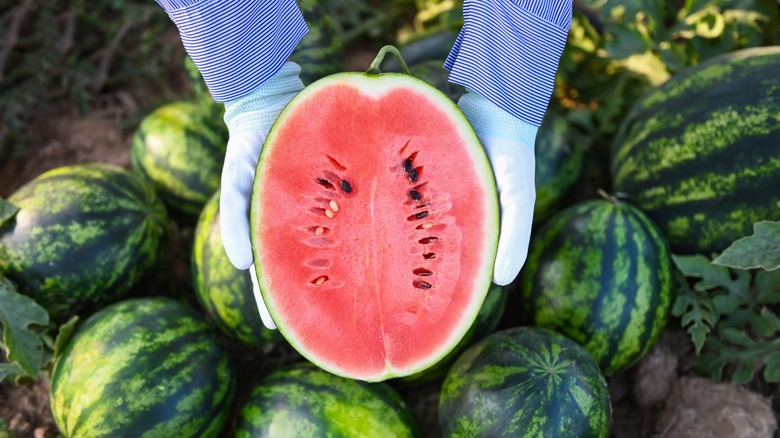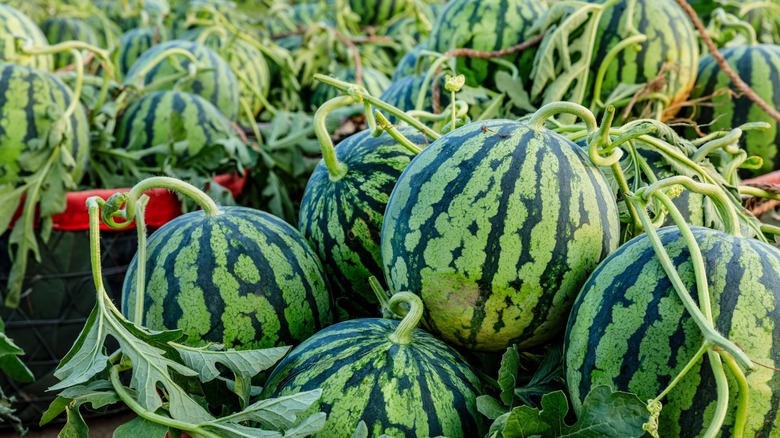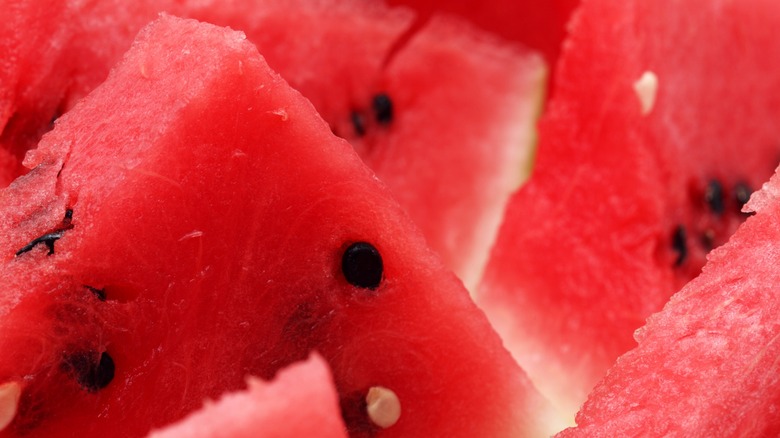Why Watermelon Is Considered A Vegetable In Oklahoma
Way back in 2007, the state of Oklahoma shook the produce world with controversy when it declared that watermelon was, in fact, a vegetable. Not just any vegetable, though. In a 78-19 victory, the Oklahoma House of Representatives voted to declare what many considered a fruit as the official state vegetable. According to then-state Senator Don Barrington, the reasoning behind the decision was that watermelon could also be considered a vegetable "because it's a member of the cucumber family."
Both Barrington and Oklahoma have close relationships with watermelon, so it's not entirely surprising that watermelon found a codified place in the political annals of the state. Although Oklahoma ranks only 12th for watermelon production, the town of Rush Springs, located in south-central Oklahoma, has celebrated an annual Watermelon Festival since 1948, attracting about 20,000 attendees every year. It's possible the people of Rush Springs viewed the watermelon vote as a political victory for the senator. But for Barrington, it wasn't purely about politics: The former senator won a watermelon seed-spitting contest in 1994, suggesting the fruit — ahem, sorry, vegetable — is near and dear to his heart.
Is watermelon a fruit or vegetable?
The Oklahoma State Senate was not entirely off in its decision to declare watermelon a vegetable, although former Senator Don Barrington's cucumber statement simplified the matter a bit. Watermelons are part of the cucurbitaceae classification — or, put more simply, the gourd family. This plant family does include cucumbers, as well as pumpkins, squash, and zucchini. Since the broadest definition of a vegetable refers to almost any harvested part of a plant, watermelons could, indeed, be classified as vegetables.
However, complications emerge from the fact that the term "fruit" has a more specific meaning than the generalized "vegetable" label. While "vegetable" broadly refers to any edible part of a plant, the term "fruit" derives from the seed-bearing products of flowering plants. In watermelon's case, the gourd originates from the crawling southern African vines that yield this delectable fruit. If there's still any doubt about watermelon's identity, the presence of seeds may provide the strongest argument that the summer snack is a fruit. The whole ordeal is made more complicated when you consider that in 2005, Oklahoma already declared its official state fruit the strawberry — which isn't technically a berry, but that's a story for another day.
The decades-long debate
The line between fruit and vegetable has always been blurred. Although former Senator Don Barrington argued that watermelon's relation to cucumbers and the rest of the gourd family could classify it as a vegetable, the technical botanical classification actually defines all members of the cucurbitaceae family as fruits. Due to their more savory flavors, however, chefs often consider gourd-like fruits such as pumpkins and zucchinis as vegetables.
The watermelon debacle is similar to the historically controversial debate over the classification of tomatoes — a battle so fierce, the federal government had to intervene. When Manhattan wholesaler John Nix & Co. faced vegetable import taxes on Caribbean tomatoes, the company argued that it didn't owe the tariff fees because the produce was actually a fruit. However, in 1893, the Supreme Court ruled that tomatoes were vegetables, based on how people prepared and consumed them in culinary settings. Notably, Justice Horace Gray admitted that squash, cucumbers, and tomatoes were scientifically all fruits, but "the common language of the people" dictated that they were vegetables. Perhaps the best compromise, as it pertains to watermelons, tomatoes, and cucumbers alike, is to acknowledge that it's possible for them all to be fruits and vegetables at the same time.



